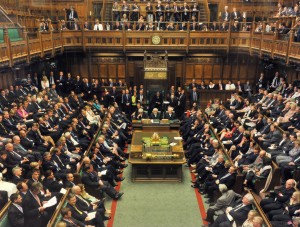The British Parliament consists of the monarchy, the House of Commons and the House of Lords.
The name “Parliament” comes from the French verb “parler” which means “to talk”.
The British parliament has used this name since the XIII century. It represents the idea that the monarch should talk with and listen to ordinary people. The King invited both nobles, the church leaders (Lords temporal and spiritual), knights and people from the towns (the Commons) to attend his parliament. Groups within parliament made suggestion for laws called “bills” and held vote on them. With time the power of the monarchy decreased and parliament became more and more powerful. Today a parliament lasts for a maximum of 5 years. The House of Commons is the more powerful of the two Houses. Recently members of nobility in the House of Lords have passed their membership from father to son. When a man died, his eldest son took his place in the House. In 1770 Scottish nobles could elect some of their members to sit in the House, and the same thing happened with Irish nobles in 1800.The religious members of the House bishops and head of monasteries were chosen to be members for life and their membership was not passed on. By the beginning of the XX century, the monarchy and the House of Lords Act changed the parliamentary system so that most nobles lost the right to sit and vote in the House.
Mayda Falco, Daniele La Macchia, Manuela Muggeo, III C/ SU
Liceo classico, Linguistico e delle Scienze Umane “F. De Sanctis” - Trani















